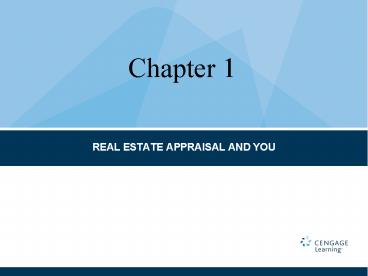REAL ESTATE APPRAISAL AND YOU - PowerPoint PPT Presentation
Title:
REAL ESTATE APPRAISAL AND YOU
Description:
USPAP. Uniform Standards of Professional Appraisal Practice. Confidentiality Report only to: Client and authorized users. State licensing agencies and third ... – PowerPoint PPT presentation
Number of Views:439
Avg rating:3.0/5.0
Title: REAL ESTATE APPRAISAL AND YOU
1
Chapter 1
- REAL ESTATE APPRAISAL AND YOU
2
CHAPTER TERMS AND CONCEPTS
- Appraisal
- Appraisal report
- Appraisal standards
- Competency Rule
- Eminent domain
- Ethics Rule
- Formal appraisal
- Highest and best use
- Informal appraisal
- Jurisdictional Exception Rule
- Legal transactions
- Market transactions
- Market value
- Property taxation
- Real estate
- Record Keeping Rule
- Scope of Work Rule
- Uniform Standards of
- Professional Appraisal Practice
- Value
3
LEARNING OUTCOMES
- Define the term appraisal.
- Explain the difference between a formal and an
informal appraisal, and between an appraisal and
an appraisal report. - List the main uses of appraisals.
- Outline the Ethics Standards of USPAP.
- List several important reasons for studying
appraisal.
4
WHAT IS AN APPRAISAL?
5
Value
..the worth, usefulness, or utility of an
object to someone for some purpose.
6
Market Value
. most probable selling price of a property in
a competitive and open market.
7
Informal Appraisal
We usually make an informal appraisal to judge if
the prices are reasonable for items we
purchase. The market analysis made by brokers
and salespeople when listing or selling a given
property is best described as an informal
appraisal.
8
Formal Appraisals
..a means of reaching an opinion of value by the
methodical collection and analysis of relevant
market data most often reported in writing.
9
FORMAL VS. INFORMAL APPRAISALS
10
WHAT IS VALUE?
- Worth
- Usefulness
- Utility
11
WHO USES APPRAISALS?
Market Transactions
- Purchase, Sale Exchange
- Financing
- Leasing
- Management
- Insurance
- Remodeling
12
WHO USES APPRAISALS?
Market Transactions
- Development
- Feasibility
- Highest and Best Use
- Exercise of Purchase and Lease options
13
WHO USES APPRAISALS?
Legal Transactions
14
WHO USES APPRAISALS?
- Eminent domain - condemnor and condemnee
- Property tax assessment and tax appeals cases
- Estate, inheritance, and gift taxes
- Income tax Casualty loss, deprecation basis and
capital gains reporting - Personal and corporate legal actions
15
WHO USES APPRAISALS?
- Environmental impact reports
- Fire or title insurance claims
- Marital and partnership dissolutions
- Landlord-tenant and property damage lawsuits
16
WHO USES APPRAISALS?
- Loan foreclosures
- Company liquidation or merger
- Bankruptcy
- Security for bail bonds
17
Ethics Rule
USPAP places ethical obligations on the appraiser.
18
USPAP
- Uniform Standards of Professional Appraisal
Practice - Conduct
- Impartiality, Objectivity, and Independence
- Management
- No undisclosed fees
- No contingent values
19
USPAP
- Uniform Standards of Professional Appraisal
Practice - Confidentiality Report only to
- Client and authorized users
- State licensing agencies and third parties
authorized by law - A duly authorized professional peer review
committee - Record Keeping
- Keep work file for 5 years
- Keep work file for 2 years after final
disposition of any judicial proceeding where
testimony was given.
20
ADDITIONAL USPAP RULES
- The Competency Rule
- Need to be competent to appraise the property by
the time you complete the appraisal report - The Scope of Work Rule
- The Appraiser Must
- Identify the Problem
- Determine and Perform correct Scope of Work to
produce Credible Assignment Results - Disclose in Report the Scope of Work
21
ADDITIONAL USPAP RULES
- Jurisdictional Exception Rule
- Use when any part of USPAP is contrary to the law
or public policy of any jurisdiction - The Supplemental Standards Rule
- Added requirements issued as policy or regulation
by Government Agencies or similar bodies
22
APPRAISAL STANDARDS
- Standard 1
- Real Property Appraisal Development
23
APPRAISAL STANDARDS
- Standard 2
- Real Property Appraisal Reporting
24
SUMMARY
This chapter stressed that an appraisal is simply
an opinion of value. Value generally means the
worth or usefulness of something to someone for
some purpose. Although there are many types of
value, the purpose of most appraisals is to form
an opinion of market value, or the price at which
something should sell.































